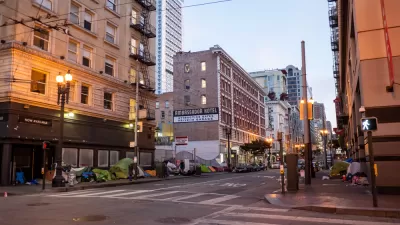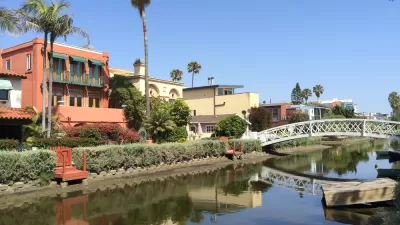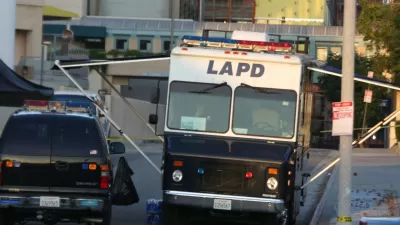A rising tide of hostility along Venice's famous boardwalk has prompted residents to call on the LAPD for help, Martha Groves reports.
Nearly two months ago, the Los Angeles Police Department began an aggressive campaign to clean up the Venice Boardwalk. In response to complaints from longtime residents and business owners, police are enforcing a midnight curfew because of transients that "openly used and dealt drugs on the beach, got into fights, smashed bottles, spat on passers-by and panhandled aggressively," according to Groves.
But Venice owes its image and culture in large part to its transient population, and the curfew has pushed many homeless people inland. "People need a place to sleep," said Carol Sobel, an attorney representing a group of homeless people whose encampment was dismantled by police. "Shutting down where people can be... creates a lot of problems. It doesn't resolve the issue but just moves them from block to block."
Other opponents of aggressive police measures include the California Coastal Commission who argue that the curfew violates state beach access rules, and those who fear that "the city runs the risk of taming the wild and woolly atmosphere that has made Venice a destination that attracts 16 million people a year."
Residents say an influx of young "travelers" from the Pacific Northwest roughly a year and a half ago brought with it a worsened sense of lawlessness on the boardwalk. Many of the transients capitalized on merchants vying for limited vendor space, "reserving" spaces oftentimes by force. The trend drove away a number of musicians and artists, while the transients used the proceeds to purchase and resell medical marijuana.
Many residents are thankful for police enforcement of the curfew: as Groves puts it, "Longtime Venetians have expressed delight at having a somewhat sanitized Venice - more 'Beach Blanket Bingo,' less 'Mad Max.'"
FULL STORY: In Venice, a battle over the boardwalk

Alabama: Trump Terminates Settlements for Black Communities Harmed By Raw Sewage
Trump deemed the landmark civil rights agreement “illegal DEI and environmental justice policy.”

Planetizen Federal Action Tracker
A weekly monitor of how Trump’s orders and actions are impacting planners and planning in America.

The 120 Year Old Tiny Home Villages That Sheltered San Francisco’s Earthquake Refugees
More than a century ago, San Francisco mobilized to house thousands of residents displaced by the 1906 earthquake. Could their strategy offer a model for the present?

Ken Jennings Launches Transit Web Series
The Jeopardy champ wants you to ride public transit.

BLM To Rescind Public Lands Rule
The change will downgrade conservation, once again putting federal land at risk for mining and other extractive uses.

Indy Neighborhood Group Builds Temporary Multi-Use Path
Community members, aided in part by funding from the city, repurposed a vehicle lane to create a protected bike and pedestrian path for the summer season.
Urban Design for Planners 1: Software Tools
This six-course series explores essential urban design concepts using open source software and equips planners with the tools they need to participate fully in the urban design process.
Planning for Universal Design
Learn the tools for implementing Universal Design in planning regulations.
Clanton & Associates, Inc.
Jessamine County Fiscal Court
Institute for Housing and Urban Development Studies (IHS)
City of Grandview
Harvard GSD Executive Education
Toledo-Lucas County Plan Commissions
Salt Lake City
NYU Wagner Graduate School of Public Service





























